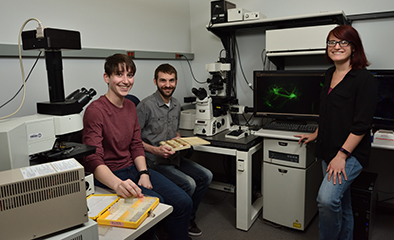CBMP Faculty
Eric Goetzman, Ph.D.

Department: Pediatrics
Email: esg5@pitt.edu
PubMed: Link
Dept / Lab Webpage: http://www.chp.edu/research/areas/genetics/projects/goetzman
CBMP groups: Genomics, Proteomics and Metabolomics, Membrane Traffic of Proteins and Lipids
Research Interests
The Goetzman Lab studies the role of post-translational modifications as regulators of mitochondrial energy metabolism. Lysine is a positively charged amino acid known to play a role in protein:DNA interactions, protein:protein interactions, and protein:lipid interactions. Lysine residues are also important for proper intracellular localization of many proteins. In recent years it has become apparent that lysine residues are subject to a myriad of post-translational modifications such as acetylation, succinylation, malonylation, glutarylation, and sumoylation, to name a few, and these modifications can alter the function of proteins. For example, we have recently shown that an important mitochondrial fatty acid oxidation enzyme known as VLCAD becomes acetylated and succinylated on three lysines that are necessary for mediating binding of VLCAD to cardiolipin on the inner mitochondrial membrane. Acylation at these sites disrupts cardiolipin binding, thereby causing mislocalization of the enzyme to the mitochondrial matrix. Acylation of VLCAD and many other metabolic enzymes can be reversed by lysine deacylases known as sirtuins. Of the seven sirtuin family members, three reside in the mitochondria: SIRT3, SIRT4, and SIRT5. The Goetzman Lab is actively studying the role of these sirtuins in governing mitochondrial function and communication between mitochondria and other organelles.
A second interest of the lab is the role of mitochondrial fatty acid oxidation in tissues where it hasn't traditionally been studied, such as the immune system and the lung. We have recently discovered that mice "knocked out" for the fatty acid oxidation enzyme long-chain acyl-CoA dehydrogenase (LCAD) display reduced lung function. Disruption of mitochondrial fatty acid oxidation in the lung causes extracellular accumulation of a lipid species known as acylcarnitines, which we have shown can interact with pulmonary surfactant and reduce its ability to lower surface tension at the alveolar air-water interface. Further work is underway to study the relevance of the fatty acid oxidation pathway to chronic lung diseases.
